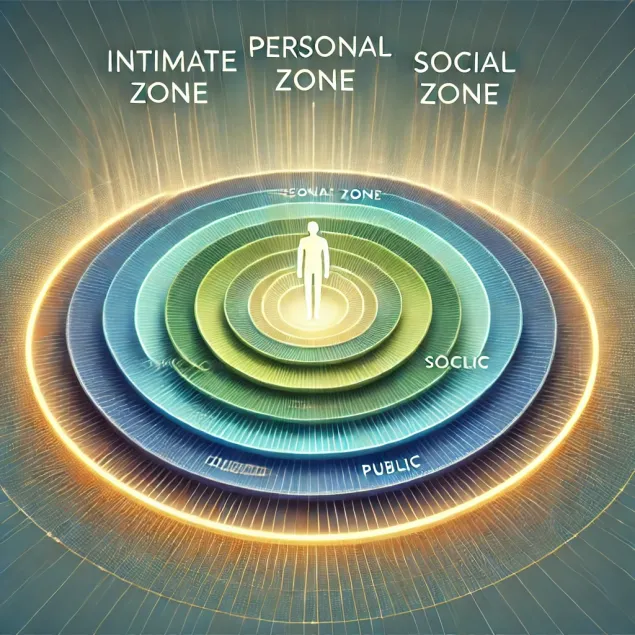317
Why you need personal boundaries and where they are: 5 tips to protect your borders

Introduction. In a world where interaction with other people is inevitable, the question of personal boundaries is becoming more acute. We communicate in the office, in social networks, in families, and often feel that someone is invading our “personal space” – whether physical, emotional or intellectual. But what are personal boundaries and why are they necessary? How to understand that our borders are being violated, and what actions to take to defend them? This article will help you understand the concept of “personal boundaries”, talk about their functionality, and offer five practical tips for their protection. The topic is especially relevant and is not tied to a specific date or event, so the material retains its importance regardless of fashion trends.
What are personal boundaries and why are they needed?
Metaphorically speaking, personal boundaries are the “fence” that separates our inner world (emotions, values, beliefs, physical comfort) from our outer environment. They help a person determine the extent to which he is willing to interact with people, which forms of behavior are acceptable to him and which are not. According to the American Psychological Association (APA), the ability to set personal boundaries is directly related to healthy self-esteem and better communication skills.
Why borders? First of all, to maintain a sense of secure identity and respect for oneself. When we understand where our area of responsibility ends and someone else’s begins, we reduce the risk of burnout, anxiety, and guilt. And when other people clearly know what is possible and impossible in communicating with us, conflicts often either do not arise or are resolved more constructively.
Where personal boundaries begin and end
One of the problems with personal boundaries is that they don't have a universal scale. Everyone has red lines that they don’t want to see crossed. But there are general principles:
- Physical boundaries: distance, touch, hugs without permission, personal belongings and property.
- Emotional and psychological boundaries: The ability to say “no” if the situation causes discomfort; the right to personal opinion and feelings, as well as the inadmissibility of manipulation and blackmail.
- Time and resource boundaries: Access to time (how much you are willing to spend on communication or help) and resources (money, ideas, skills).
- Intellectual boundaries: Respect for your point of view, unwillingness to hear insults to your beliefs.

5 Tips for Protecting Personal Borders
1. Say your “rules” out loud.
Often people who violate our borders do so unconsciously, simply because we have never voiced what is unpleasant to us. On the other hand, when it comes to really toxic people, demonstrating your “rules” helps make certain behaviors unacceptable.
- How it works: For example, if it is important to you that colleagues do not write to you in messengers after 22:00, tell them about it directly. Or if a friend borrows money from you all the time and doesn't pay you back on time, say, "I'm not comfortable lending money outside of certain conditions." ?
- Which gives: formation of transparent communication. Other people know what you expect and what you think is unacceptable.
2. Develop the ability to say “no”
The ability to say no is one of the most effective means of protecting borders. Many people are afraid to say no so as not to look rude or selfish. But delimiting your time, strength, and personal space is an important part of self-respect. In addition, constantly agreeing to other people’s requests, you risk accumulating hidden aggression and resentment.
- Council: Before you automatically say yes, pause and think about whether you really want or can. Suffice it to say politely and briefly, “Unfortunately, I can’t help you right now.”
- Example of practice: If a friend asks to “go to the store” at night, and you in the morning to work, think about whether it will hurt your plans and mood.
3. Install a filter against manipulation
Toxic individuals often use another person’s emotions to punch through their “armour” and force them to act in their own interests. For example, they may push pity, threaten emotional blackmail ("If you don't do it, I'll be offended"), devalue ("You don't understand anything about it"), or turn to aggression. The ability to recognize such techniques is the key to maintaining mental health.
- Signs of manipulation: You feel an unexplained sense of guilt or fear when someone asks for or claims something.
- How to counter: Stay calm, ask clarifying questions (“Why do you think I have to do this?”), and avoid emotional outbursts.
4. Respect the boundaries of others
Paradoxically, the fact is that those who do not respect other people’s borders are more likely to face a misunderstanding of their own. Mature communication implies that you not only protect your own territory, but also are ready to accept other people's rules. If your friend doesn’t like being called on the weekend, try shifting your habits and negotiating time.
- Reason: Mutual respect encourages trust and deepens communication.
- Result: Having developed a habit of recognizing other people’s “no-go zones”, you will be more effective in defending your own.

5. Contact specialists if necessary.
If it seems that the situation is hopeless, and the environment or a particular person is constantly suppressing you, there is a risk of getting stuck in a traumatic scenario. In such cases, counseling a psychologist or psychotherapist can help, where you will find tools to strengthen self-esteem and develop skills for setting boundaries.
- When it matters: If you feel that you are in a toxic relationship (family, work, or friendship) and are unable to change the dynamic on your own.
- Advantages: Professionals help you “see” your behavior patterns and give specific recommendations.
How to Know if Borders Work
If you have started to apply the listed tips, then it is worth assessing the effect. Healthy personal boundaries usually make you feel more calm and confident. You stop falling for people or accumulating discontent within. There is a clear understanding of what communication you are ready for and in what format, and what interaction you do not need.
There’s a secondary benefit: Changes in you can push loved ones to reassess how they treat you. Some of your surroundings may not be ready to accept the new rules and weed out, but this is sometimes a necessary sacrifice on the way to a healthier and more sincere relationship.
Boundaries and harmonious personality
Finally, it is worth noting that personal borders are not a hard defensive wall with no checkpoints. Rather, it is a flexible gate system: you decide to whom and to what extent to open access to your emotions, time and resources. There is no selfishness in this, there is self-care and self-esteem awareness. A person with well-built boundaries tends not to shift the responsibility for his own happiness to others, but also not to allow others to drive themselves into an uncomfortable framework.

Conclusion
Personal boundaries are the foundation of psychological comfort and the most important tool for healthy interaction with others. We decide what frameworks to set, but each has its own values and priorities. The main thing is not to forget to voice and, if necessary, protect these borders. The above five tips are only part of what you can do to protect your right to personal space, emotional security and self-respect. After all, only when we feel safe can we realize our potential and build strong and sincere connections with others.
After all, to be open to the world and at the same time preserve your “I” is not a contradiction, but harmony, which we all intuitively strive for.
How self-care and self-love manifest: 9 important signs for self-examination
Resentment is a dangerous weapon: 5 reasons to cope with resentment and not to offend other people























